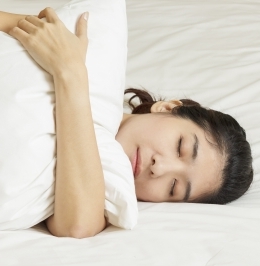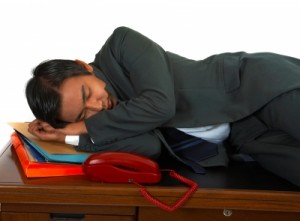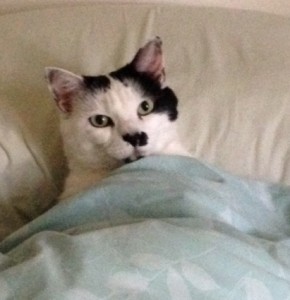Five Reasons Why Sleep is Imperative

One of the best things we can do for ourselves is get enough sleep. Yet, in the U.S., 50% of adults don’t get enough sleep, and 70% of teenagers are sleep deprived!
In America, we value productivity and play so highly, that we tend to dismiss the value of rejuvenation. Some of us think sleep is a waste of time. We might have a youthful optimism about sleep. We often stay up later than we should, and fool ourselves into believing we will be fine, yet the consequences of sleep deprivation can be dire!
Most of us are aware of the more immediate symptoms of sleep deprivation. We don’t react as quickly, think as well, it can be harder to concentrate, it can make us moody and irritable. And the more tired we are, the more susceptible we are to falling asleep. If we are operating heavy machinery, like a car, that could have dire consequences.
Interestingly, research shows that after 3 days of sleep deprivation, we seem to lose the awareness that we are sleep deprived. Unbeknownst to us, our judgment becomes impaired. We seem to settle into a new normal and deceive ourselves into thinking we are fine, despite the fact that we are still experiencing the same symptoms!
are fine, despite the fact that we are still experiencing the same symptoms!
If we survive the short-term effects of sleep deprivation, over the long term, we are increasing our accumulative stress burden and our risk of chronic diseases, and destroying our brain.
These are my five most compelling reasons for getting a good night’s sleep.
Weight gain
Sleep impacts several hormones that can affect our weight. Poor sleep increases the stress hormone cortisol. It also increases insulin after a meal. Both insulin and cortisol promote fat storage. Cortisol seems to promote more retention of far in the stomach. Sleep deprivation also is associated with lower levels of leptin, and higher levels of ghrelin. Ghrelin stimulates appetite, while leptin tells the brain when the body has enough food. Thus sleep deprivation increases one’s risk of obesity.
Mood Disorders
Chronic sleep issues are correlated with depression, anxiety and other forms of mental distress. A recent large study showed that for teenagers, every extra hour of deprivation was correlated with 38% increased risk of sadness and hopelessness, a 42% increase in consideration of suicide and 58% increase in attempted suicide, and a 23% increased risk of substance abuse.
Learning and memory
Sleep is essential for declarative memory (what we know), and procedural memory (remembering how to do something). We also need enough sleep to focus. Judgment becomes impaired, and risk of accidents goes up when we are sleep deprived.
Sleep cleans the brain of neurotoxins
In 2013, neuroscientists discovered that during sleep, the brain activates the glymphatic nervous system to clear out neurotoxins. Specifically, the glial cells shrink during sleep, and this allows more space between the neurons to flush away the toxins. The neurotoxins that are flushed out are the ones that accumulate in neurodegenerative diseases, such as Alzheimer’s, Parkinson’s and Huntington’s disease.
Increased risk of accidents
Sleep deprivation is thought to cause at least 20% of all motor vehicle crashes. Also according to the Institute of medicine, 50-100,000 deaths and over one million medical injuries are preventable. Many are thought due to be due to the long shifts that interns have to endure without sufficient sleep. Sleep deprivation has also played a role in numerous high profile accidents, such as the Exxon Valdez oil spill, the Challenger, the nuclear accident at Three Mile Island and the nuclear meltdown at Chernobyl.
Want to learn more about sleep?
 I highly recommend the documentary Sleeplessness in America, and check out Harvard’s Sleep Website.
I highly recommend the documentary Sleeplessness in America, and check out Harvard’s Sleep Website.
Are you finding it difficult to fall asleep or stay asleep? I’ve found that many people struggle with sleep problems due to an overactive mind (thanks to stress), and or excess EMF in their environment or a significant magnetic field imbalance. I bought a Nikken sleep system that corrects these problems, and enhances your quality of sleep so that you need less. And now I feel completely rejuvenated when I get only 6.3 hrs a night! Before I needed 8.5 hrs of sleep, and I did not sleep as deeply!
Do you need help getting to bed earlier, falling asleep or staying asleep? If you are interested in learning more about the Nikken sleep system or want help to more specifically address your needs, listen to my interview on Releasing Subconscious Barriers: The Key to Health and Happiness and call me at 1 855 ENERJOY for a complimentary consultation.
“Young Beautiful Woman Sleeping In Bed” by FrameAngel courtesy of freedigitalphotos.net
“Tired Businessman Sleeping” by Stuart Miles courtesy of freedigitalphotos.net



